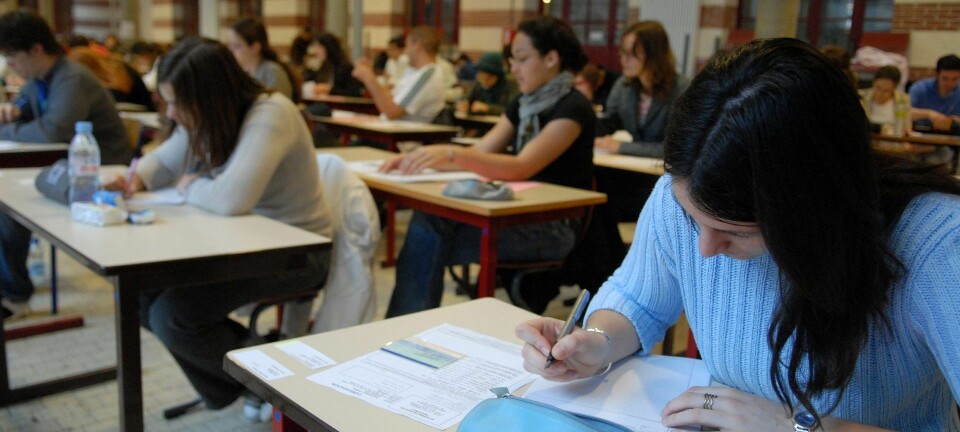
Weak students don’t benefit from excessive praise
Offering exaggerated praise to a child who has learning difficulties does not increase his or her motivation. False compliments can often be counterproductive.
Denne artikkelen er over ti år gammel og kan inneholde utdatert informasjon.
Many of today’s parents and educators have grown up in an atmosphere where heaping abundant amounts of praise on students is expected to reinforce motivation and learning.
If you still believe it is essential for you to tell your kids or your pupils things like “You’re the best”, “You can do it” and “You’re a winner”, you are very wide of the mark.
“We should be generous with kids, but that kind of praise isn’t motivational. It’s just the opposite,” says Professor Terje Manger of the University of Bergen’s Department of Psychology.
Summary of research on motivation
Manger is a member of the Psychology Department’s Bergen Learning and Cognition Group and was asked to assess the conclusions from research on motivating children.

Hundreds of studies have been conducted, but this is the first time that a Norwegian professor has summarised this research.
Focus on proficiency, not the person
Manger says that one of the key factors for a child’s success in school is that parents and teachers really expect and count on the child to learn something.
Adults need to be engaged and supportive – but not indiscriminately supportive.
“A pupil who fails to grasp a subject will not believe exaggerated praise. The pupil has so little self-esteem that he or she will see through the praise and find it hollow and unconvincing. Then the encouragement has the opposite effect,” Manger said.
On the other hand, if the teacher can determine what the pupil already knows, so that assignments can be tailored to this level as a point of departure, and so the teacher can provide constructive feedback on progress, the child’s chances of learning and being motivated will increase.
Feedback that contains information specific to the pupil will be much more motivational. Above all, the child will have the sense that he or she is making headway and beginning to master a subject, which is a main factor in gaining self-confidence.
Authoritative teachers are best
Manger’s studies of research results also point to another fact – one type of teacher tends to be the most successful at motivating pupils.
Researchers call this an authoritative teacher.
“An authoritative teacher wants and expects the pupils to learn. At the same time, he or she projects a lot of care for and attention to the pupil,” Manger said.
An authoritarian teacher makes academic demands, without attempting to display the same care and attention to the pupil.
Teachers can be divided into four types: authoritative, authoritarian, indulgent and neglectful. Fortunately the latter category is rare.
Manger says there is a huge difference between authoritarian teachers and authoritative teachers.
Indulgent teachers are an extra burden
Some international studies show that when it comes to successfully motivating pupils, the gap is particularly wide between authoritative and indulgent teachers.
An indulgent teacher can be competent in the subjects taught and be a good, caring adult who gives a pupil a lot of attention. But this type of educator will tend to overlook the facts that all pupils, including those who are not great achievers, appreciate being subjected to demands.
Such teachers also score poorly in their abilities to lead and maintain discipline in a classroom.
“Indulgent teachers have a direct negative impact on pupils’ motivation and contentment, primarily because they have low expectations and demands. This can actually be experienced as an extra burden among the pupils who are struggling to learn,” says Manger.
Authoritarian better than indulgent
He was surprised to find research concluding that indulgent teachers appear to be a greater impediment for school children’s motivation than authoritarian teachers are.
“An authoritarian teacher scores lower in caregiving and attentiveness, but makes higher scholastic demands. International studies place this type of teacher ahead of indulgent ones with regard to pupils’ learning and contentment.”
Teachers need to be taught leadership
Manger thinks Nordic schools may have suffered because many teachers have been overindulgent.
“The most important focus we could have in Norwegian schools today would be to increase teachers’ competence in leading school classes.”
Excessive testing undermines motivation
An extensive testing culture, which currently holds sway as a cure for problems with schools, gets little support from the systematic study of research literature.
“A stringent test regimen that unilaterally focuses on grading undermines the motivation of weak as well as creative pupils. We could be doing ourselves a disservice if we place too much emphasis on that recipe,” says Manger.
Research does show that tests serve an important function, however.
“Tests motivate individual pupils. Tests are also important for gauging scholastic progress and a pupil’s development. But when a teacher uses tests, he or she should emphasize giving the pupils feedback on their progress. This enables pupils to progress from their individual levels,” says the researcher.
Translated by: Glenn Ostling


































